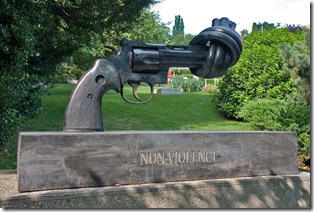 In 2005, my senior year at Wheaton College, in my ‘Christian Thought’ class, I participated in a debate on the topic: “Christians can Support and Participate in War.”
In 2005, my senior year at Wheaton College, in my ‘Christian Thought’ class, I participated in a debate on the topic: “Christians can Support and Participate in War.”
I was on the CON side, in line with my still being formed beliefs on what a Christian stance regarding war should be. I like resurrecting old writings and so I figured I’d share my opening statements from this debate I had in my college class. I’m not sure if I would hold so strongly to some of my points any more, but as this was a debate amongst Christians who believe the Bible is authoritative, I think these are still decent opening statements. I figure, as this Stories of Nonviolence series continues, there will inevitably be questions regarding the topic and I want to put this post as sort of the discussion point for the topic. Here are my opening lines:
Christian men and women, we have entered the battlefield. The true test has come: Will you follow the instructions of your commanding officer or act on your own judgment of the situation? It could be that from your view in the trenches His commands will result in the terrible death of many and even the triumph of the enemy over you. Will you, instead, respond in the way you discern is most in line with what He would have commanded if placed in your situation?
This debate is not a debate of effectiveness. It is irrelevant whether one side or the other would have been more or less effective of a response, whether in Nazi Germany or Saddam in Iraq. We must rest solely in the faith that following the commands of our God, who has revealed himself in Scripture, will result ultimately in the greatest good.
We believe that the scripture is inerrant and infallible; it is here that our debate lies. Whether His Word calls for us to take up arms is what we are here to debate, not whether this human action or that will result in the loss of less lives.
As Christians we are not to waver our beliefs based on the most current events. It is not because of Christianity’s rationality, reasonability and logical that we hold it to be true; we follow Scripture because we confess Christ as Lord.
Our Discussion is to be based on the Bible. “Fear God and keep his commandments, for this is the whole duty of man.” (Ecc. 12:13)
We also are not advocating that we do nothing. Pacifism does not equal passiveness. The same God that has told us to “love our enemies” has also told us to “do justly.” We hold each of those commands to be true and relevant, but we do not think they come in conflict with one another. We are here to say that war is not an option open to Christians. What options are open is extremely important, but it is not the discussion we are to have here. In fact, my earnest hope is that you will see what I believe to be true in the scripture, that is, that war is not an option, and will begin to think about and discuss what options there are.
We are in the trenches, and are loyalty is being tested. Do you believe that your commanding officer, the Sovereign God of the universe has in mind the best interest of you, your ally and your enemy? You would do good to follow His commands.
“For the foolishness of God is wiser than man’s wisdom, and the weakness of God is stronger than man’s strength.” I Cor. 1:25

 I’d love to continue to collect stories of non-violence here. So, if you find any other stories let me know and I’ll post them.
I’d love to continue to collect stories of non-violence here. So, if you find any other stories let me know and I’ll post them. “The Myth of Redemptive Violence is the story of the victory of order over chaos by means of violence.” It was through my reading of Christ’s teachings to “Love your enemies” and the idea of overcoming evil with good, that I began to realize that there must be another road to victory than violence. Quite simply, I found I could not support a culture of war and violence and still claim to follow Christ’s teachings, I could not rationalize it.
“The Myth of Redemptive Violence is the story of the victory of order over chaos by means of violence.” It was through my reading of Christ’s teachings to “Love your enemies” and the idea of overcoming evil with good, that I began to realize that there must be another road to victory than violence. Quite simply, I found I could not support a culture of war and violence and still claim to follow Christ’s teachings, I could not rationalize it.